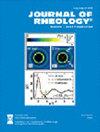Joncryl 扩链剂与聚乳酸的反应性:d-内酯含量、Joncryl 类型和加工温度的影响
IF 3
2区 工程技术
Q2 MECHANICS
引用次数: 0
摘要
在本研究中,一种高结晶性聚乳酸和一种无定形聚乳酸(即 cPLA 和 aPLA)分别具有较低(0.5 摩尔 %)和较高(12 摩尔 %)的 d-乳酸含量和相似的分子量,在 190 °C 下与两种不同的多功能环氧基 Joncryl 扩链剂(CE,即 ADR 4400 和 4468)进行了熔融共混。此外,还研究了 Joncryl 牌号与 aPLA 在 150、170 和 210 °C 熔融加工温度下的反应性。为了了解 Joncryl 与聚乳酸分子反应的程度,我们进行了小振幅振荡剪切流变分析,并使用凝胶渗透色谱法测定分子量来确认结果。此外,还比较了加工样品的延伸粘度,以控制其应变硬化行为。结果表明,Joncryl 与 cPLA 和 aPLA 的反应在对链延伸或分支的偏好方面有所不同,这表明在反应熔体加工过程中,分子的规整性会影响与两种 Joncryl 的相互作用。此外,虽然加工温度的升高加速了聚乳酸的降解,但却明显提高了两种 Joncryl 牌号与 aPLA 的反应活性。在所有情况下,由于 ADR 4468 的官能度高于 ADR 4400,因此在分子链延伸/分支方面的反应性更强。差示扫描量热结果还显示,cPLA 的结晶受 Joncryl 含量和类型变化的影响不同。本文章由计算机程序翻译,如有差异,请以英文原文为准。
Joncryl chain extender reactivity with polylactide: Effect of d-lactide content, Joncryl type, and processing temperature
In this study, a highly crystallizable and an amorphous polylactide (i.e., cPLA and aPLA) with, respectively, low (0.5 mol. %) and high (12 mol. %) d-lactic acid contents and similar molecular weights were melt compounded with two different multifunctional epoxy-based Joncryl chain extenders (CEs, i.e., ADR 4400 and 4468) at 190 °C. Reactivity of Joncryl grades with aPLA was also explored at melt processing temperatures of 150, 170, and 210 °C. Small amplitude oscillatory shear rheological analysis was conducted to understand the extent of the Joncryl reaction with PLA molecules, and the results were confirmed with molecular weight determination using gel permeation chromatography. Extensional viscosity of the processed samples was also compared to control their strain hardening behavior. Results showed that the Joncryl reaction with cPLA and aPLA differs in terms of preference for chain extension or branching, indicating that molecular regularity affected the interactions with both Joncryl grades during reactive melt processing. Moreover, although the increase in processing temperature accelerated PLA degradation, it noticeably increased the reactivity of both Joncryl grades with aPLA. In all cases, ADR 4468 was more reactive in molecular chain extension/branching due to its higher functionality than ADR 4400. Differential scanning calorimetry results also revealed that the crystallization of cPLA was differently affected by the change in the Joncryl content and type.
求助全文
通过发布文献求助,成功后即可免费获取论文全文。
去求助
来源期刊

Journal of Rheology
物理-力学
CiteScore
6.60
自引率
12.10%
发文量
100
审稿时长
1 months
期刊介绍:
The Journal of Rheology, formerly the Transactions of The Society of Rheology, is published six times per year by The Society of Rheology, a member society of the American Institute of Physics, through AIP Publishing. It provides in-depth interdisciplinary coverage of theoretical and experimental issues drawn from industry and academia. The Journal of Rheology is published for professionals and students in chemistry, physics, engineering, material science, and mathematics.
 求助内容:
求助内容: 应助结果提醒方式:
应助结果提醒方式:


